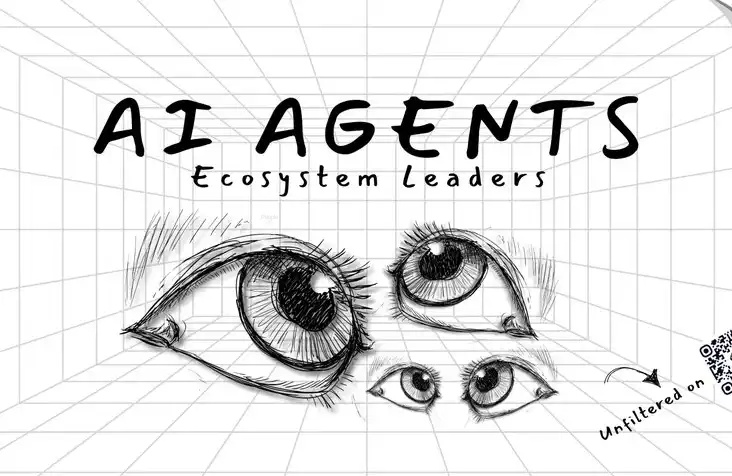Founder of Paradigm: Cryptocurrency, a new planet that is being over-colonized.
Original Title: "New Work by Paradigm Founder: Cryptocurrency Exploration and Speculation on the Martian Gambling Table"
Original Author: Matt Huang, Co-founder and Managing Partner of Paradigm
Translated by: MarsBit
We can think of cryptocurrency as a new planet that is being colonized.
Many critics see it as a barren and worthless planet, even considering it nothing more than a dirty casino. However, optimists see the potential of this untapped land: a place where more advanced financial systems and internet platforms can be built.
New settlers come in all shapes and sizes, including adventurers drawn in by cutting-edge technology and opportunists with questionable motives. Innovators and researchers are lured by new possibilities, while ordinary people, especially those marginalized on Earth, are also joining their ranks.
The governance is still in an uncertain stage. Some jurisdictions on Earth prohibit their citizens from traveling to the new planet, while others are seeking a foothold in this new world.
This new planet's history has been marked by cycles of speculation and hype, which has led many to doubt its future direction. Today's cryptocurrency frenzy is just a self-starting process. Just as the gold rush of 1849 transformed San Francisco from a quiet village into a major port (ultimately becoming a center of technological innovation), today's cryptocurrency boom is also attracting settlers and driving infrastructure development, transforming it from a barren planet into a prosperous crypto civilization.

A new encrypted planet has been born. Bitcoin is the first group of settlers, while exchanges like Coinbase and Binance allow you to easily travel to and from this planet. Ethereum has become the largest city, with Uniswap being the best means of transportation...
Why do we choose encryption?
Settling on a new planet undoubtedly requires tremendous effort. But is it really worth it?
Where existing systems fail, what we need most is a new property rights system. BTC, ETH, and stablecoins have been widely adopted globally, especially in places like Argentina, Turkey, and Ukraine, where they are more widely accepted by ordinary people.
Although many are still waiting for the "killer app" of encryption, it has already arrived. It may just not be as noticeable to those living in the first world. If you ask an Argentine about encryption, they will tell you without hesitation about its uses. Today, cryptocurrency is not only a useful tool, but also a speculative high-end market. It is rapidly developing and becoming a typical Christensen-style disruptive innovation case, becoming increasingly useful to more people.
Currency is just the first "killer app", and it won't be the last. Cryptocurrencies will give birth to a more transparent, programmable, and open financial service. It is a cheaper, more convenient, and more inclusive solution for those who cannot use banking services due to high fees or do not trust the increasingly centralized banking system. We see stablecoin payments rising rapidly, and loans can be obtained through simple coding rather than complex banking or brokerage programs. Systemic risks can even be reduced by tracking collateral globally.
Looking to the future, with the expansion of cryptographic infrastructure, we can anticipate the possibility of new consumer applications. Creators will have more rights in their creations, and users will have better control over their identities.
From a more macro perspective, this new planet provides us with an opportunity to reshape existing systems and upgrade them to more advanced and flexible systems. Cryptography can not only do this for currency, finance, and digital assets, but also for everything that the internet has done for information and media.
More importantly, encryption provides a means of preventing the increasing centralization of the world. In a world where "big" is becoming mainstream, we are slowly losing our appreciation for individual and diverse forces. By promoting the collaboration of small and diverse forces, encryption has become an important force against centralized power and a driving force for freedom, protecting us from the control of big corporations and governments.
Speculation and Cryptocurrency
Although cryptocurrency has its advantages, is its speculative nature really necessary? In fact, speculation is not only necessary, but can also be highly valuable.
Speculative investment is the cornerstone of technological revolution. From the rise of telecommunications and the internet to the dominance of railways, electricity, and automobiles, breakthroughs in new technologies are often intertwined with speculation and asset bubbles. As meticulously documented by Carlota Perez, they become an integral part of the process towards mainstream adoption. In the field of cryptocurrency, speculation has driven attention and awareness, investment flows, talent accumulation, infrastructure development, academic research, and the adoption of existing companies.
Furthermore, there is a deeper connection between speculation and cryptocurrency: it is the "Hello World" of digital asset rights. When people have the opportunity to create rare assets, they tend to trade them. Give a group of children some Pokémon cards and see what happens. The true value of a new property rights system lies in its ability to reliably record the transfer of property, which is why people naturally begin to try and test it. If this new system has not yet been widely recognized, it may move towards a diverse future, where price fluctuations and trading activity will become more speculative.
Remember in the early days of Bitcoin, people thought it was a pipe dream that it would one day achieve its current legal status and value. I witnessed early adopters mining, contributing, experimenting, and even buying pizza with it in excitement. Now, more than a decade later, BTC and other cryptocurrencies like ETH are steadily transitioning from speculative playthings to global commodities.
Speculation has played a core role in the process of cryptocurrencies becoming a decentralized financial system. Many financial products have a clear "utility value" on one side of the transaction, but speculation is needed to meet the needs of the other side. For example, someone may need a 30-year mortgage to buy a house, but there is no inherent demand to provide this 30-year loan. Our modern financial system mediates between such practical needs and more abstract financial return needs. In the field of cryptocurrencies, a similar system is being established that includes participants such as speculative traders, infrastructure providers, market makers, MEV searchers, blockchain builders, DeFi protocols, stablecoin issuers, Uniswap arbitrageurs, and others. Building such an N-sided market is not easy and requires time to develop. But as time goes on, participants become more mature, liquidity increases, and chain-based financial markets will become stronger.
There is a dark side to the speculative "casino" aspect
Although some criticisms of cryptocurrencies may lack creativity, some of them do have their merits. Casinos can serve as a useful launching tool, but they may also bring unwanted consequences and backlash.
Innovation relies on capital and labor being used in valuable experiments. Over-speculation, airdrops, and other malicious behaviors may create noise and disrupt price signals that could guide beneficial innovation. Even the most well-intentioned entrepreneurs may be misled by incorrect price information or distracted by short-term profits, slowing down the actual construction process needed for cryptocurrencies.
Short-term speculation is essentially a zero-sum game, in which seasoned traders extract value from novices, which can cause them sustained harm. A free market should welcome all participants, as long as their behavior is legal and ethical. But if we view the adoption of cryptocurrencies as part of a social coordination game, choosing the optimal time frame may become a prisoner's dilemma. Through long-term cooperation, we can achieve a more satisfactory outcome.
Ultimately, bad behavior is all too common in the industry: scammers, fraudsters, and hackers continue to pose a threat. Imagine a world full of rogues who "welcome" newcomers through violence and robbery - that's the cryptocurrency landscape in San Francisco. Like the early days of the internet or the gold rush era, this cutting-edge open field has not only fostered innovation, but also bred illegal activities. Although good actors still prevail - such as the rise of a group of world-class white hat security experts - the industry still needs more self-regulation and standards.
Why is the progress so slow?
Cryptocurrency has a history of nearly 15 years. Shouldn't it have already become popular and mainstream by now?
Actually, exploring a new field takes time, and most people are only willing to move to a new field when the infrastructure is complete and no longer socially excluded. The progress of technology also has its limits and can only be fast to a certain extent. The social dissemination of new ideas is often full of twists and turns, rather than smooth sailing. Due to the speculative nature of assets, they experience periodic and drastic fluctuations; at one moment people highly regard the prospects of cryptocurrency, believing it is the future of everything, but in the next moment they claim it has lost its vitality.
Establishing social consensus around cryptocurrency is even more challenging than creating network effects around communication protocols or social networks. People can quickly recognize the practical value of WhatsApp or Instagram because they can communicate with a small group of familiar friends through these platforms. For a new property system, it is about how to safely transact with people you are not familiar with or do not fully trust, which requires broader recognition and legitimacy. We still have a long way to go, but it is encouraging that today you can already transact with over 100 million people using BTC, ETH, or stablecoins.
Outlook Beyond the Casino
Many technologies that we take for granted today were once considered impossible, useless, dangerous, or fraudulent. Today, Apple has become the world's most valuable company, but when it first went public in 1980, its stock sales were banned in Massachusetts due to perceived risks. Cryptocurrencies are no exception, as every year since 2010, there have been voices claiming that Bitcoin is dead.
However, human history has repeatedly shown that we often oppose reforms because we adhere to the status quo, especially when these reforms are disruptive. Cryptocurrencies are touching on profound concepts of currency, value, governance, and human collaboration. We need to maintain an open-minded attitude and explore the possibility of building better things, rather than simply rejecting cryptocurrencies out of suspicion.
We must go beyond the speculative nature of cryptocurrencies and recognize it as one of the most important guiding mechanisms of current technology. We need to delve into the new world of cryptographic technology, think about its substantive construction and true purpose, rather than just chasing speculative hotspots.
Appendix
If we compare encryption technology to a new planet, what would that mean?
Encryption Community
The encryption industry represents a comprehensive ecosystem, and we should all work together to build it. There are more common ideas than differences between the different cities on this new planet. More importantly, we need to persuade the residents of Earth to settle on this new planet or protect it from the impact of inadequate Earth regulations, rather than engaging in internal extremist conflicts.
As Vitalik said, it is very important for the encryption industry to think about how to build a complete system. The new world cannot always rely on the infrastructure of the old world. Currently, the network system we rely on includes Google, Twitter, Github, and the credit card system, as well as an independent network system in China, including WeChat, Alipay, Weibo, and DCEP. We need to build an independent encryption system that operates like the Chinese system, but is more open and guarantees autonomy.
For a new planet, having a unique culture is beneficial. We may not want cryptographic technology to disappear into the background, or make the new planet highly similar to Earth.
Builder
Building products in the encryption industry is not just a technical issue ("What can be built on the new planet?"), it is also a social issue ("Do the residents of the new planet really need this?").
A good way to find ideas for encryption startups is to think deeply about what early settlers on a new planet might need. Do they need food or shelter? Then you can consider providing those services. Another good method is to consider the uniqueness of the new planet and create unique products based on that. Perhaps the way gravity works is different, which could give rise to new products.
Some products are best suited for settlers on a new planet, such as decentralized finance (DeFi); others can be seen as bridges connecting the new planet and Earth, such as centralized finance (CeFi); and there are also some that can use the technology of the new planet to serve Earth, such as financial technology products that use stablecoins.
One common failure pattern is to build products for mainstream users before they are ready to migrate to a new planet. A wiser approach is to focus on those who have already adapted to the new planet's environment or are preparing to go there. At the same time, another failure pattern is to overly focus on building for early settlers and neglect the large number of potential new users who may come in.
Existing Enterprises
Existing companies on Earth can also play a certain role. The most natural way is to act as a bridge between the new planet and Earth, while also attempting to build localized products.
Encryption can be seen as an emerging market. This is not just about adopting new technologies, but about entering a new realm with its own culture. Just as restaurants adjust their menus according to different countries, or companies hire local managers, adjusting your team and products according to the characteristics of the new world can be very helpful.
One common failure pattern is to misunderstand the unique nature of a new planet, such as when banks were once obsessed with "blockchain instead of bitcoin." This is like simply adding a new layer to the bank's exterior to make it look more like the new planet, but completely losing its essential meaning.
Policy makers
Contrary to intuition, encryption technology may ultimately benefit the US dollar. The US dollar stablecoin has become one of the most popular currencies on the new planet, with its influence far surpassing that of any other earthly currency.
Witnessing the disorder and savagery on the new planet may make people feel the urge to take excessive and aggressive actions, such as prohibiting travel to the new planet or strictly limiting activities there. However, this will prevent the new planet from developing from its current primitive stage to a stage that may produce long-term innovation.
One better approach is to maintain a long-term perspective, holding onto safe havens and the freedom to operate without permission. Punish criminal behavior when it occurs, but also maintain an open attitude towards experimentation and innovation by those who do good.
Original article link
Welcome to join the official BlockBeats community:
Telegram Subscription Group: https://t.me/theblockbeats
Telegram Discussion Group: https://t.me/BlockBeats_App
Official Twitter Account: https://twitter.com/BlockBeatsAsia
 Forum
Forum OPRR
OPRR Finance
Finance
 Specials
Specials
 On-chain Eco
On-chain Eco
 Entry
Entry
 Podcasts
Podcasts
 Data
Data

 Summarized by AI
Summarized by AI







